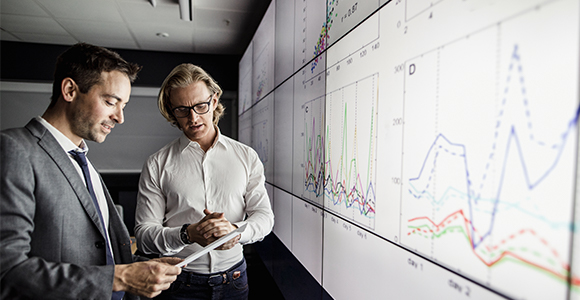Technology & Innovation
Broad technologies, digital communities, and automated trading
November 10, 2021
-
3 minutes

The COVID-19 pandemic forced many companies to rely on digital collaboration, but there are differences between staying connected virtually and knowledge sharing virtually. Screens and speakers don't generate the same energy as tossing ideas between cubicles or fleshing them out in brainstorming sessions. Between technology glitches and Webex fatigue, businesses are confronting the impacts of the virtual environment on the next, great idea.
"We've definitely become professionals in video conferencing, instant messaging and group chats. In some respects, we've levelled the playing field for globally distributed teams. The access that folks have, it's a positive," says Daniel Bosman, Vice President of Technology Solutions, TD Securities, at our recent Innovation with a Purpose session. "We do miss the whiteboard sessions. I'm looking forward to more opportunities to brainstorm and innovate in person. That's been hard to recreate digitally."
The challenges span many companies and industries. "The pandemic changed the nature of innovating. We weren't really a work-from-home company pre-pandemic. Across the board, we pulled together and shifted to virtual work quickly," says Shawn Edwards, Bloomberg’s Chief Technology Officer. "Our engineers are not fully back, but once they come back, we're going to be living in a hybrid world. We're going to have to figure out how to properly use our days together on the whiteboard, and then put our heads down for coding, developing, and whatever else when outside the office."
Daniel and Shawn discussed more on the changing technology landscape as it relates to data, machine learning and cross-collaboration. The conversation focused on the effects of the COVID-19 pandemic in the workspace, the barriers to brainstorming, and the cutting-edge ways companies collect and share information.
"We've definitely become professionals in video conferencing, instant messaging and group chats. In some respects, we've levelled the playing field for globally distributed teams. The access that folks have, it's a positive," says Daniel Bosman, Vice President of Technology Solutions, TD Securities, at our recent Innovation with a Purpose session. "We do miss the whiteboard sessions. I'm looking forward to more opportunities to brainstorm and innovate in person. That's been hard to recreate digitally."
The challenges span many companies and industries. "The pandemic changed the nature of innovating. We weren't really a work-from-home company pre-pandemic. Across the board, we pulled together and shifted to virtual work quickly," says Shawn Edwards, Bloomberg’s Chief Technology Officer. "Our engineers are not fully back, but once they come back, we're going to be living in a hybrid world. We're going to have to figure out how to properly use our days together on the whiteboard, and then put our heads down for coding, developing, and whatever else when outside the office."
Daniel and Shawn discussed more on the changing technology landscape as it relates to data, machine learning and cross-collaboration. The conversation focused on the effects of the COVID-19 pandemic in the workspace, the barriers to brainstorming, and the cutting-edge ways companies collect and share information.
Open source innovation
The conversation also touched on the open source community, a group of software engineers that thrives on using collaboration to accelerate innovation. Developers can consume and simultaneously contribute ideas or code, often leveraging technology innovations and research in fields like security, data, artificial intelligence, and machine learning. Anybody can go in and tweak the content, but nobody can lay claim to it. A number of businesses are embracing this model, allowing engineers to make the best use of the free resources and, more importantly, give back. This resonates with employees who are motivated to contribute to the open source community and build upon our digital world.
"It used to be that you'd solely look to traditional technology companies for leading, cutting-edge databases and middleware. That's not true anymore. We do a lot of contributions to open source. We fund several open source initiatives," says Edwards. "I think it's a really great time to be a software engineer. You can work on projects and share what you created so anybody can use it."
"It used to be that you'd solely look to traditional technology companies for leading, cutting-edge databases and middleware. That's not true anymore. We do a lot of contributions to open source. We fund several open source initiatives," says Edwards. "I think it's a really great time to be a software engineer. You can work on projects and share what you created so anybody can use it."
Automated trading
Investing in data is a familiar strategy that plays an important role in TD's strategic partnership with Bloomberg. While high-quality data is key, there is rising interest in leveraging automation, as well as machine learning techniques. Analyzing vast amounts of data allows us to identify patterns, perform more complex tasks, and create new efficiencies. Behind the scenes, domain experts source data, sort data, and understand how to utilize data.
The TDS Automated Trading (TDSAT) team is our newest investment in this space. Previously Headlands Tech Global Markets, LLC (HTGM), this firm's proprietary software delivered fully automated electronic market-making in municipal and investment grade corporate bonds. TDSAT's experience in incorporating quantitative trading strategies across financial products will result in more electronic solutions for our clients.
As global markets continue to shift towards e-trading, companies have to make the right investments or risk falling behind. On our end, we continue to lean into innovation to deliver high value to our clients. Technology is only a small part of the big picture; the rest is readying our people for the future by empowering them to use technology in their own teams and on their own terms.
The TDS Automated Trading (TDSAT) team is our newest investment in this space. Previously Headlands Tech Global Markets, LLC (HTGM), this firm's proprietary software delivered fully automated electronic market-making in municipal and investment grade corporate bonds. TDSAT's experience in incorporating quantitative trading strategies across financial products will result in more electronic solutions for our clients.
As global markets continue to shift towards e-trading, companies have to make the right investments or risk falling behind. On our end, we continue to lean into innovation to deliver high value to our clients. Technology is only a small part of the big picture; the rest is readying our people for the future by empowering them to use technology in their own teams and on their own terms.
Learn more about our automated trading services and capabilities

Managing Director and Vice President, Cross Asset Platforms, Data & Innovation, Technology Solutions, TD Securities

Managing Director and Vice President, Cross Asset Platforms, Data & Innovation, Technology Solutions, TD Securities

Managing Director and Vice President, Cross Asset Platforms, Data & Innovation, Technology Solutions, TD Securities



